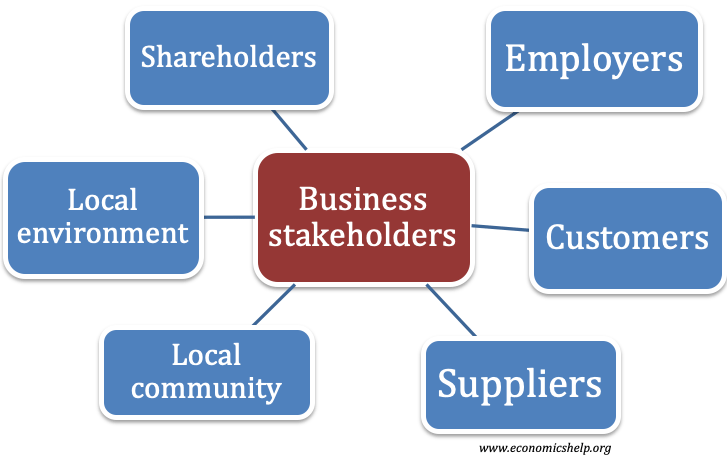Stakeholders are groups of people who are involved or affected by a particular business.
The main stakeholders of a business are:
- Shareholders – people who own shares in the company
- Employees – workers employed by the company
- Customers – People who buy and use the products the firm makes
- Suppliers – Firms who sell raw materials to the firm.
- Local Community – local area affected by business, e.g. local shops who sell sandwiches at lunchtime.
- Local environment – increasingly people are considering the environmental impact of business, not just people.
- Wider economy – for some very large business, their actions may affect the whole economy. If General Motors went bust, it would have an impact on the wider US economy.
More detail on different stakeholders
Shareholders/owners
In some business (private limited companies, self-employed) the shareholders may be limited to a small number of owners. Also, these owners may have a very close connection to running the firm. In larger public limited companies, share ownership is much more widespread. Investors have less input in the running of the company and maybe more detached about the treatment of workers and the local community – wishing to maximise profits.
Employees
Employees may see their job as a means to an end and feel little loyalty to the company. But, full-time workers who feel invested in the company will have greater loyalty and may be more willing to do overtime and take an interest in the company. It depends on whether the workers feel a sense of importance and creativity in their job. In some companies, there has developed an adversarial relationship between workers and management, with workers feeling they are treated as commodities. In other companies, (e.g. Japanese) there is a different culture and all workers are encouraged to see business as part of their family.
Customers
Some customers may just buy products and not really feel like a stakeholder. But, other business may develop a much closer relationship with customers, e.g. builders and architects need to work closely with their customers on a personal level.
Suppliers
Some suppliers may become dependent on a particular business. For example, specialist suppliers to a big car factory might send 80% of their production to one particular firm. Sometimes clothes shops enter into exclusive contracts with clothing makers, so all their production is earmarked for a firm.
Local community/environment
A business will have an impact on the local community in a variety of ways
- Environmental impact of business operations
- Impact on local economy through employing workers, buying from suppliers.
Business in History
In the nineteenth century, it was the custom for business owners to exploit workers with long hours and low pay. Workers were seen as a commodity to help maximise profits. However, a few entrepreneurs saw things different. For example, Robert Owen sought to offer better conditions and education to his workers in his mills. He paid higher wages and had better conditions than many of his contemporaries. However, in his purpose-built mill in new Lanarkshire, he showed that improving the condition of different stakeholders could complement a successful business rather than work against it.
How stakeholders can help business
- A motivated and loyal workforce will have a lower turnover rate, meaning the firm spends less on training new staff. Productivity may be higher
- Suppliers paid on time will be more willing to do favours for the firm. If suppliers go out of business, a firm will lose in the long run.
- Helping the local community/environment can be good PR and help the brand image of the firm. Negative publicity, e.g. firms using child labour can lead to boycotts of firms.
Some firms like Marks & Spencers give shares to their employees. The John Lewis partnership is more like a co-operative where workers (members) are given a share in the profits. A similar situation to the Co-operative.
Trade-Off between Shareholders and Stakeholders
- If a firm is too generous to workers and looking after the environment it could lose profitability and go out of business. Firms need to obey environmental law, but they also have to compete against other firms at home and abroad.
- Maximising profit may be the best way of securing long term future of firm and jobs. In the short term, it may be necessary to make some workers redundant to retain profitability.
- Some companies may be primarily concerned with pleasing the shareholders. This could involve low wages for workers, high prices to consumers and squeezing suppliers. The firm increases profit, but at costs to other stakeholders
- Other firms may feel that a successful business requires good relations with all stakeholders in a business. For example, giving workers performance-related pay encourages greater productivity. Giving a perceived ‘fair’ deal to consumers is important for maintaining long-term customer loyalty.
Related


Talk about difference between for profit and not- for profit stakeholders
Thanks.